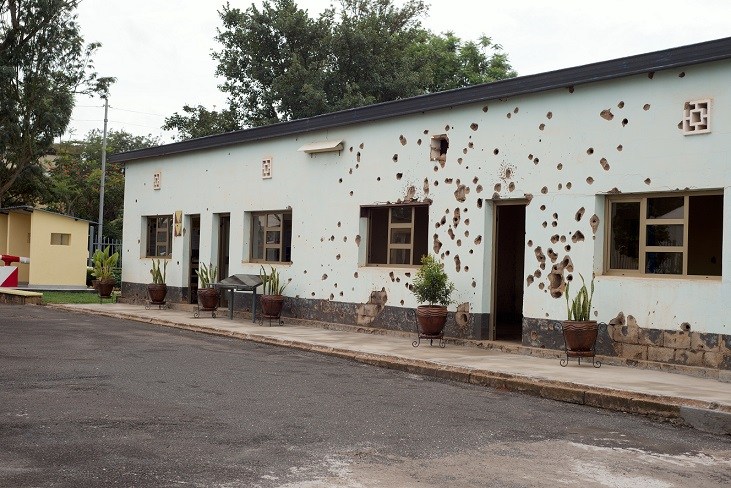The 30th commemoration of the genocide in 1994 against the Tutsi in Rwanda when an estimated one million people were killed in less than 100 days was recently marked with ceremonies in Brussels and Kigali with the EU and member states recalling their failure to prevent it.
As previously reported, Belgian Foreign and Defence Ministers paid tribute on Monday in the capital of Rwanda to the 22 Belgians who lost their lives in the 1994 genocide in Rwanda. Among them were 10 Belgian soldiers who were killed at the Kigali camp when serving as peacekeepers with the UN Assistance Mission for Rwanda (UNAMIR).
The UN force had no mandate to stop the killings despite that its commander, the Canadian general Romeo Dallaire in January 1994 had warned that the Hutu government in Kigali planned to carry out a blodshed. “We could have actually saved hundreds of thousands," he said afterwards.
When he reported to the UN headquarters about the imminent danger, he was told that a military invention went beyond the mandate. The task of UNAMIR was to support the implementation of a peace agreement and it was only made up of 440 peacekeepers. Military engagement was restricted to situations where the lives of the peacekeepers themselves were in direct danger.
In an interview in The Brussels Times (by Christian Ernhede), the Belgian Ambassador Johan Swinnen described the chaotic situation in Kigali. He had been sent there to oversee "Operation Silver Back", the evacuation of over 1,000 Belgian civilians in a country that had already seen widespread massacres since the death of the president five days earlier.
According to the interview, regional and global powers were pitted against each-other in Rwanda in what may have been a form of proxy-war for strategic and economic control. In particular France continued to provide arms and military traying to the regime and the Hutu militias.
Furthermore, Belgium’s colonial legacy in Rwanda contributed to the ethnic tensions in the country. Belgium permanented a caste system in Rwanda and issued identity cards which revealed the ethnic origin of the inhabitants. During the genocide, it made it easy for the Hutu perpetrators to single out the Tutsi and kill them.
It was only in April 2000 that then Belgian prime minister Guy Verhofstadt travelled to Kigali and said, “In the name of my country and of my people, I beg your forgiveness.”
In his speech at the commemoration ceremony in Kigali, European Council President Charles Michel said that he, as a Belgian and European, was aware that Europe owes a dept to the African continent. “The international community did not react. In a way complicit, they stood back, closed their eyes.” He referred also to the Belgian apology in 2000.
In a statement on behalf of the EU, Josep Borrell, EU’s High Representative for Foreign Affairs and Security Policy, said that the memory of the genocide against the Tutsi is a lesson to the rest of the world. “The EU will continue to stand by the people of Rwanda and its transformation journey,” the statement says, referring to Rwanda’s recovery and the reconciliation process after the genocide.
This might explain why the EU recently signed a Memorandum of Understanding with Rwanda on the Sustainable Raw Materials Value Chain only two weeks after Borrell had issued a statement expressing concerns about the worsening of the humanitarian situation in the eastern part of the Democratic Republic of the Congo (DRC) and condemning Rwanda on the escalation of hostilities there.
While the EU statement did not mention if and how the genocide could have been prevented, Borrell returned to the issue in his speech at a ceremony at the Rwandan embassy in Brussels.
“It is difficult to believe that in 100 days over 1 million people [were] murdered in the middle of unspeakable atrocities. And the international community was unwilling, but not unable to protect them, as many times in the history [it] happens. We regret, but we do not act.” His speech focuses on the need of reconciliation but also accountability.
“We must speak up and redouble our efforts to stop hate speech and ethnic politics before they turn out of control, because it grows very quickly,” he concluded.
“There are examples in history where words become arms that kill, kill a lot because [they] push others to kill. Because words can create a fire, they can toxify the minds of the people and make them believe that another human being does not deserve to live.”
In Rwanda, the genocide was declared in advance and could have been prevented. The Srebrenica massacre in the Bosnia war a year later could also have been prevented. Nazi-Germany announced early its genocidal intentions against the Jews in Europe but the world did not believe that a civilized county was capable of committing genocide and dismissed early reports about the Holocaust.
The legal term ‘genocide’ was not even known before WWII. It was proposed by the Polish-Jewish lawyer Rafael Lemkin during the war and refers to the protection of groups against mass killings. His proposal would result in the 1948 UN convention on genocide. In the Nuremberg trials in 1945, the charge of crimes against humanity was preferred over genocide against the Nazi perpetrators.
M. Apelblat
The Brussels Times

